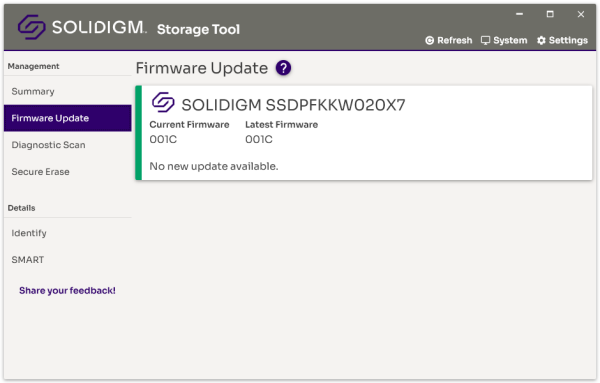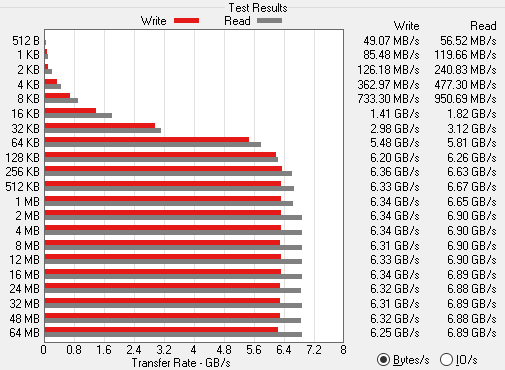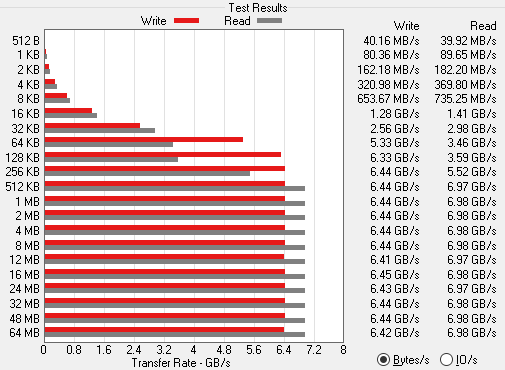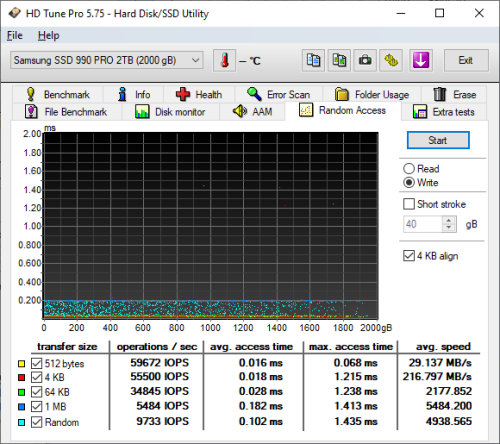

Model: Solidigm P44 Pro 2TB PCIe 4.0 M.2 Solid State Drive
Manufacturer: SK hynix
Provided By: SK hynix
While the name Solidigm might seem relatively new to some, the companies behind it have decades of experience in the data storage and semiconductor industries. What was once Intel's SSD business, Solidigm was sold to SK hynix in December 2021 and then spun off into its own subsidiary. Headquartered in San Jose, CA, Solidigm continues to offer innovative NAND flash memory solutions, including cutting-edge client and data center SSDs for the retail and OEM markets.
Solidigm recently released its new flagship client SSD, the P44 Pro. Designed for intense performance workloads like gaming, content creation, video editing, and data analysis, this M.2 form factor drive is powered by SK hynix's "Aries" controller and is available with up to 2TB of their 176-layer 3D TLC NAND flash. The P44 Pro is also equipped with an ultra-fast PCIe Gen4 x4 NVMe 1.4 interface and features a proprietary NVMe storage driver that automatically and invisibly boosts performance by as much as 21% over devices running the default Windows driver.
The P44 Pro is available in 500GB, 1TB and 2TB capacities. For this review, Solidigm sent us the 2TB version of the drive which is capable of delivering up to 7,000 MB/s sequential read and 6,500 MB/s sequential write speeds as well as up to 1,400K random read and 1,300K random write IOPS.
| Solidigm P44 Pro 2TB PCIe 4.0 M.2 Solid State Drive | |||||||||||||||||||||||||||||||||||||||||
General Specifications
Performance
Reliability
Power Consumption
Dimensions and Weight
Other Features
|
Needless to say, this is only a taste of what the P44 Pro has to offer. To give you an idea of what to expect, we'll take a closer look at Solidigm's new PCIe 4.0 SSD and then see how well it performs. Does the P44 Pro have what it takes? More importantly, is it the best bang for your buck? Keep reading as we find out.
The P44 Pro comes in a small black and blue box. Along with a picture of the drive, the packaging advertises a number of its key features including its 2TB capacity, maximum transfer speed, PCIe 4.0 NVMe interface and 5 year warranty. Inside, you'll find the SSD as well as a small guide containing installation instructions and a warranty statement.

Physical Features:
The P44 Pro uses the 2280 form factor for M.2 (NGFF) SSDs. It measures 22 x 80 x 2.29 mm and tips the scales at a little less than 7g. The drive also has an "M key" edge connector which provides PCIe SSDs with up to 4x lanes of bandwidth.

The P44 Pro is equipped with SK hynix's "Aries" ACNS075 controller. We still don't know much about this PCIe Gen 4 x4 SSD controller besides that it powered by a quad-core ARM Cortex R5 CPU and has eight channels as well as support for NVMe version 1.4.

For the 2TB version of the P44 Pro, Solidigm has opted to use SK hynix's 176-layer 3D TLC NAND flash. If you'd remove the sticker, you'd see that there are two 1TB NAND flash packages on the top of the PCB. The drive also has a single 2GB LPDDR4 DRAM chip that is used for caching.
Like Solidigm's other SSDs, the P44 Pro works with their Storage Tool. This free downloadable utility is an easy way for users to obtain information about their drives. Additionally, it can be used to update their drives' firmware, run diagnostic scans and perform a secure erase.
When you run Solidigm's Storage Tool, the main screen displays information about your drives. From here, you can view information like the model number, serial number, firmware version, which storage controller the drive is using, temperature and the estimated remaining life. You can even see which volumes are on the drive and how much of the total capacity they are using.

Using Solidigm's Storage Tool, you can download and apply firmware updates to your drives. The software also gives you the ability to run two different diagnostic scans, quick and full. The quick diagnostics scan checks a small portion of the drive for read errors and then performs a brief data integrity scan. Usually, this test is completed in about three minutes. The full diagnostics scan checks every logical block address (LBA) for read errors and then uses all of the free space for a data integrity scan. Needless to say, the full scan takes much longer to complete.

The Storage Tool also includes a Secure Erase feature that will permanently delete all of the data on an SSD. It eliminates the user data section of the drive as well as the reserve data area, rendering data remnants virtually unrecoverable.
Last but not least, the Storage Tool can be used to display your drive's standard identification as well as its SMART attributes.
The test system used in this review is equipped with an AMD Ryzen 5 3700x CPU, MSI B550 GAMING PLUS motherboard, 16GB (8GB x 2) of Crucial Ballistix 3200 MHz DDR4 memory, Crucial P5 1TB SSD and a GIGABYTE GeForce GTX 1060 WINDFORCE OC 6G graphics card. For the operating system, I used the latest version of Windows 10 Pro. Unless otherwise stated, the P44 Pro has been tested using Solidigm's NVME storage driver.
To test the performance of Solidigm's P44 Pro SSD, I ran a series of benchmarks using CrystalDiskMark, HD Tach RW, ATTO Disk Benchmark, AS SSD, HD Tune Pro, Anvil's Storage Utilities, Iometer and PCMark. For comparison, I've also included test results from the Samsung 990 PRO, ADATA LEGEND 960, Crucial P3 Plus, SK hynix Platinum P41, Silicon Power XS70, WD_BLACK SN770, ADATA XPG ATOM 50, ADATA XPG GAMMIX S70 Blade, Crucial P5 Plus, Plextor M10PY, ADATA XPG GAMMIX S70, Sabrent Rocket 4 Plus, WD_BLACK SN850, Silicon Power US70, ADATA XPG GAMMIX S50 Lite, ADATA Elite SE880, Kingston XS2000, ADATA XPG ATOM 30, Samsung 980, Silicon-Power UD70, Crucial P2, SK hynix Gold P31, Crucial P5, ADATA SWORDFISH, ADATA FALCON, Lexar NM610, Silicon Power P34A60, Patriot P300, Plextor M9PG Plus, Plextor M9PY Plus, Crucial X8, ADATA XPG SX6000 Pro, Western Digital WD_BLACK SN750, Samsung 970 EVO Plus, ADATA XPG SX8200 Pro, Crucial P1, ADATA XPG SX8200, Western Digital WD_BLACK NVMe, Samsung 970 EVO, Samsung 970 PRO, Plextor M9Pe, Plextor M8Se, Patriot Hellfire, ADATA XPG SX8000, Samsung 960 PRO, Toshiba OCZ RD400, Samsung 950 PRO, ADATA Ultimate SU670, Lexar NQ100, Samsung 870 EVO and Samsung 870 QVO.
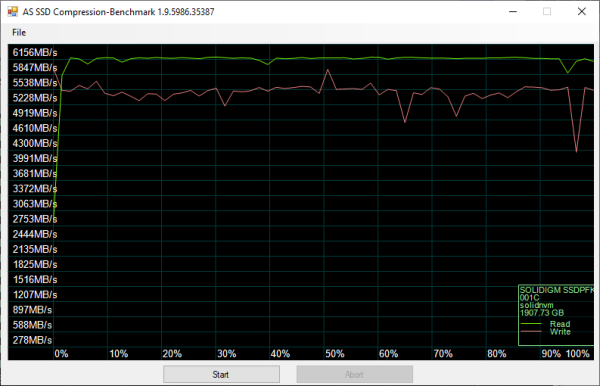
As I mentioned earlier, the P44 Pro uses SK hynix's "Aries" ACNS075 controller chip. Looking at the screenshot above, you can see that it performs equally well with both incompressible (0%) and compressible (100%) data.
CrystalDiskMark 8.0.4:
First, I ran a few quick tests using CrystalDiskMark. This benchmark measures the performance of a storage device by testing its sequential and random read and write speeds. For this test, we're using the peak and real world profiles.
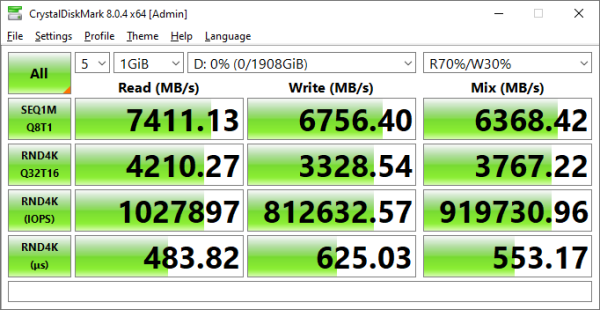
According to Solidigm, the 2TB version of the P44 Pro is capable of reading at 7,000MB/s and writing at 6,500 MB/s. As you can see, the drive had no problems reaching these speeds in CrystalDiskMark's sequential read and write tests.

As you'd expect, the P44 Pro wasn't as fast when tested with the "real world" profile which uses a single thread and a much lower queue depth. Nevertheless, it was still able to read at 5,874 MB/s and write at more than 5,237 MB/s.
HD Tach RW 3.0.4.0:
Next, I used HD Tach to test the P44 Pro's read, write and burst speeds as well as its random access time and CPU usage.

Looking at the screenshot above, you can see that the P44 Pro had average read and write speeds of 3,130.7 MB/s and 1903.4 MB/s respectively, as well as a burst speed of 3,220.4 MB/s. The screenshot also shows that, like most other TLC-based SSDs, the P44 Pro uses some sort of SLC caching. The drive starts writing at about 2,500 MB/s and then drops to about 1,700 MB/s when the write operation exceeds the size of the cache.
ATTO Disk Benchmark 4.01:
I also used ATTO Disk Benchmark to test the P44 Pro's sequential read and write speeds. The tests are run using blocks ranging in size from 512B to 64 MB and the total length set to 256MB.
When tested with ATTO, the P44 Pro's read speeds topped out at about 6.90 GB/s and its write speeds at 6.36 GB/s.
AS SSD:
AS SSD is a benchmark designed specifically for solid state drives. The application contains five synthetic tests used to determine the sequential and random read and write performance of a drive.
AS SSD also includes a copy benchmark. This test copies an ISO (two large files), program (many small files) and game (small and large files), returning the speed and duration of each.
HD Tune Pro 5.75:
Next, I ran a series of tests using HD Tune Pro. This hard disk utility measures a drive's performance by testing its sequential read and write speeds as well as its access time, burst rate and CPU usage. For this review, I'm also going to use it to benchmark the P44 Pro's random read and write speeds, random access times and the number of operations per second.
The P44 Pro performed relatively well when benchmarked with HD Tune. The drive had average read and write speeds of 4579.2 MB/s and 2,595.1 MB/s, respectively.
When reading 4KB blocks, the P44 Pro reached 72,759 IOPS and had an average speed of 284.215 MB/s. The drive was even faster when writing, reaching 77,065 IOPS with an average speed of 301.037 MB/s.
Anvil's Storage Utilities:
Anvil's Storage Utilities is another benchmark designed with SSDs in mind. The standard storage benchmark measures a drive's performance by testing its transfer speeds, access times and IOPS.

Iometer:
Lastly, I ran a series of tests using Iometer. This tool can be configured to benchmark a number of things. In this case, I used it to measure the P44 Pro's read and write speeds and the number of operations per second. The tests were run using random bytes and a queue depth of 3.

The P44 Pro's performance was very similar to what we saw in our other tests. The drive was able to read at 7062.86 MB/s and write at a blazing 6332.85 MB/s.
The P44 Pro also performed very well when doing random reads and writes. In our tests, the drive was able to read at 479.44 MB/s and write at 672.11 MB/s.

According to Solidigm, the 2TB P44 Pro is capable of 1,400k IOPS when reading and 1,300k IOPS when writing 4K blocks. With two threads and a queue depth of three, the drive reached 122,136 random read IOPS and 172,059 random write IOPS.

As with most drives, the P44 Pro performed better with more threads and at higher queue depths. With sixteen threads and the queue depth set to 32, it reached 1,003,488 random read IOPS and 795,101 random write IOPS.
PCMark 8 - Storage Test:
PCMark 8 is a complete benchmark for Windows. It includes five benchmark tests, each designed around a specific scenario. The storage benchmark measures drive performance using real-world traces recorded from Adobe Creative Suite, Microsoft Office and a selection of popular games.

PCMark 8 also includes a test which measures the performance consistency and degradation tendency of a storage system. The test reports the performance level at the start, the degraded steady-state and the recovered state as well as the number of iterations required to reach the degraded state and the recovered state. For this test, we are focusing on the Adobe Photoshop (Heavy) trace and will look at both the bandwidth and latency of the drive.


The P44 Pro didn't do as well as some of the other drives in this test. During the degradation and steady phases, its bandwidth dropped below 350 MB/s. The P44 Pro's performance did increase somewhat during the last recovery phase. However, with it topping out at only 793 MB/s, it lagged behind the Samsung 990 PRO, ADATA LEGEND 960 and Silicon Power SX70.
PCMark 10 - Full System Drive Benchmark:
PCMark 10's Full System Drive Benchmark uses a wide-ranging set of real-world traces from popular applications and common tasks to fully test the performance of the fastest modern drives. This benchmark produces an overall score as a measure of drive performance. Comparing devices is as simple as comparing scores. The tests also measure and report the bandwidth and average access time performance for the drive.
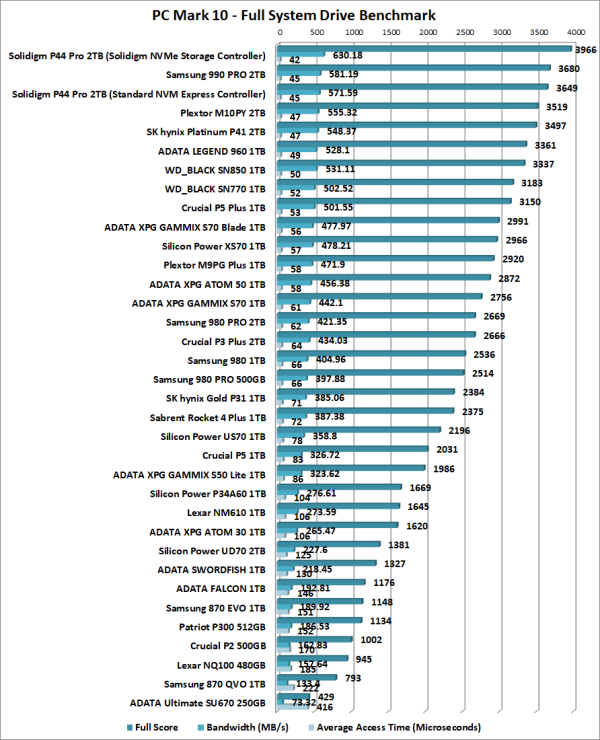
Thanks to its high bandwidth and low latency, the P44 Pro did very well in PCMark 10's Full System Drive Benchmark. By itself, the drive was second only to the Samsung 990 PRO. With Soldigm's NVME storage driver installed though, the P44 Pro was able to take the top spot, beating the 990 PRO by a sizeable margin.
Temperature:
While PCIe SSDs like the P44 Pro offer impressive performance, they also generate a good amount of heat. At idle, the drive's temperature hovered around 37 ºC. When pushed hard, the drive reached temperatures as high as 79 ºC when both reading and writing.

Surprisingly, these temperatures had no impact on the P44 Pro's performance. No matter how hard I pushed it, the drive did not throttle its read or write speeds in any noticeable way.
Final Thoughts:
The P44 Pro is the first SSD from Solidigm to come through the 'Labs and to be honest, they could not have made a better first impression. This compact, M.2 form factor drive is powered by SK hynix's "Aries" controller and is available with up to 2TB of the company's 176-layer 3D TLC NAND flash. Combine this with Solidigm's proprietary NVMe storage driver and a PCIe Gen4 x4 NVMe 1.4 interface and you have one of the fastest PCIe 4.0 SSDs on the market today. The 2TB version of the P44 Pro flew through our sequential transfer rate tests, reading at speeds as high as 7,411 MB/s and writing at more than 6,756 MB/s. The drive also did fairly well in our random write tests, producing nearly 172,000 IOPS at low queue depths, and took the top spot in PCMark 10's storage benchmark.
The P44 Pro is available now in 500GB, 1TB and 2TB capacities. Prices on Amazon.com currently range from $81 up to $220 for the 2TB version reviewed here.

Highs:
- Available in 500GB, 1TB and 2TB capacities
- PCIe 4.0 x4 interface with NVMe protocol
- SK hynix Aries controller
- Equipped with 176-Layer 3D TLC NAND
- Excellent sequential and random read and write performance
- Small M.2 2280 form factor
- Large DRAM cache
- Works with Solidigm's Storage Tool and NVMe storage driver
- Supports 256-bit AES hardware-based encryption
- Reasonably priced
- 5 year warranty
Lows:
- Gets hot under heavy workloads


